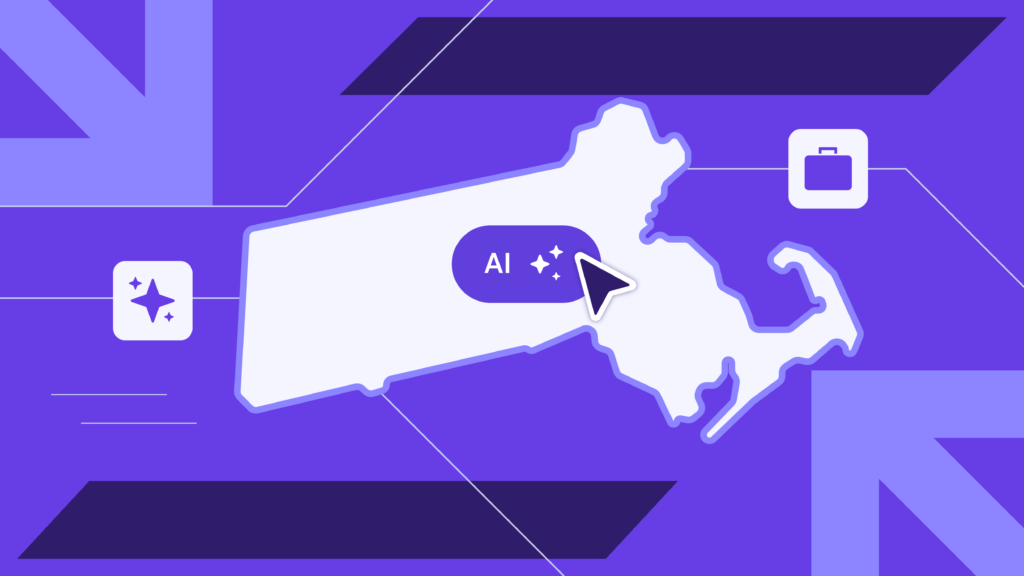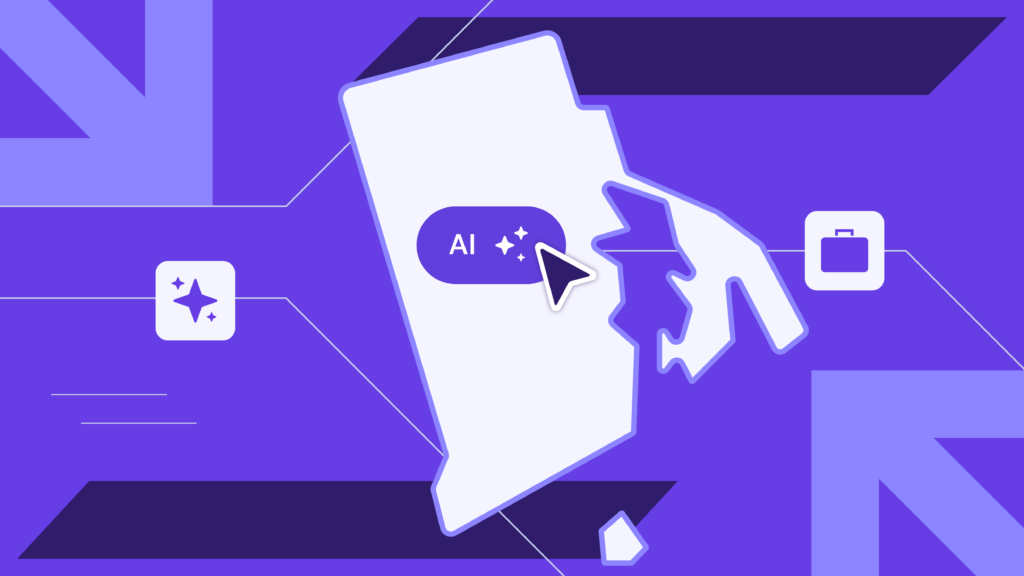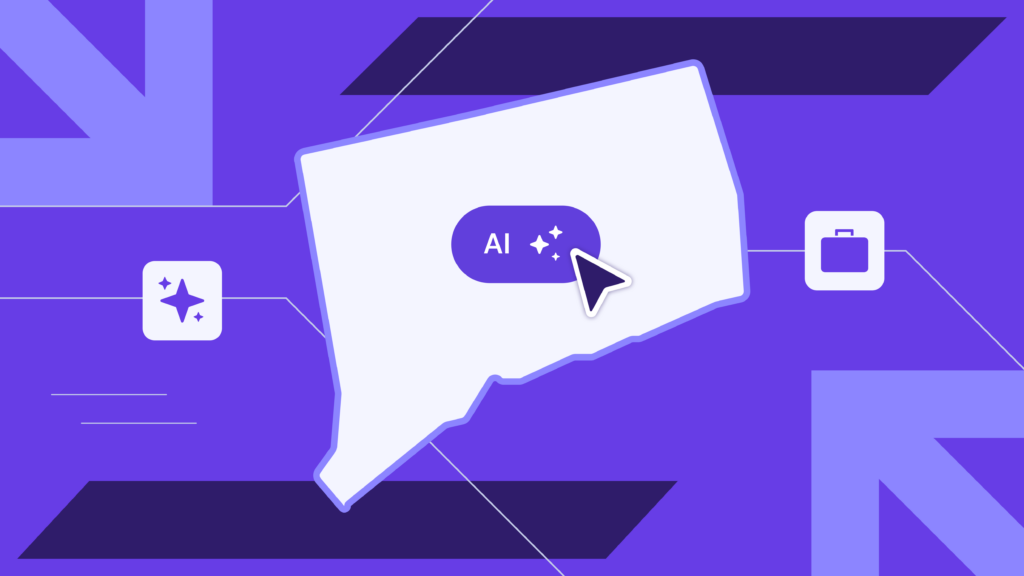AI myths busted: What Americans believe vs what’s true
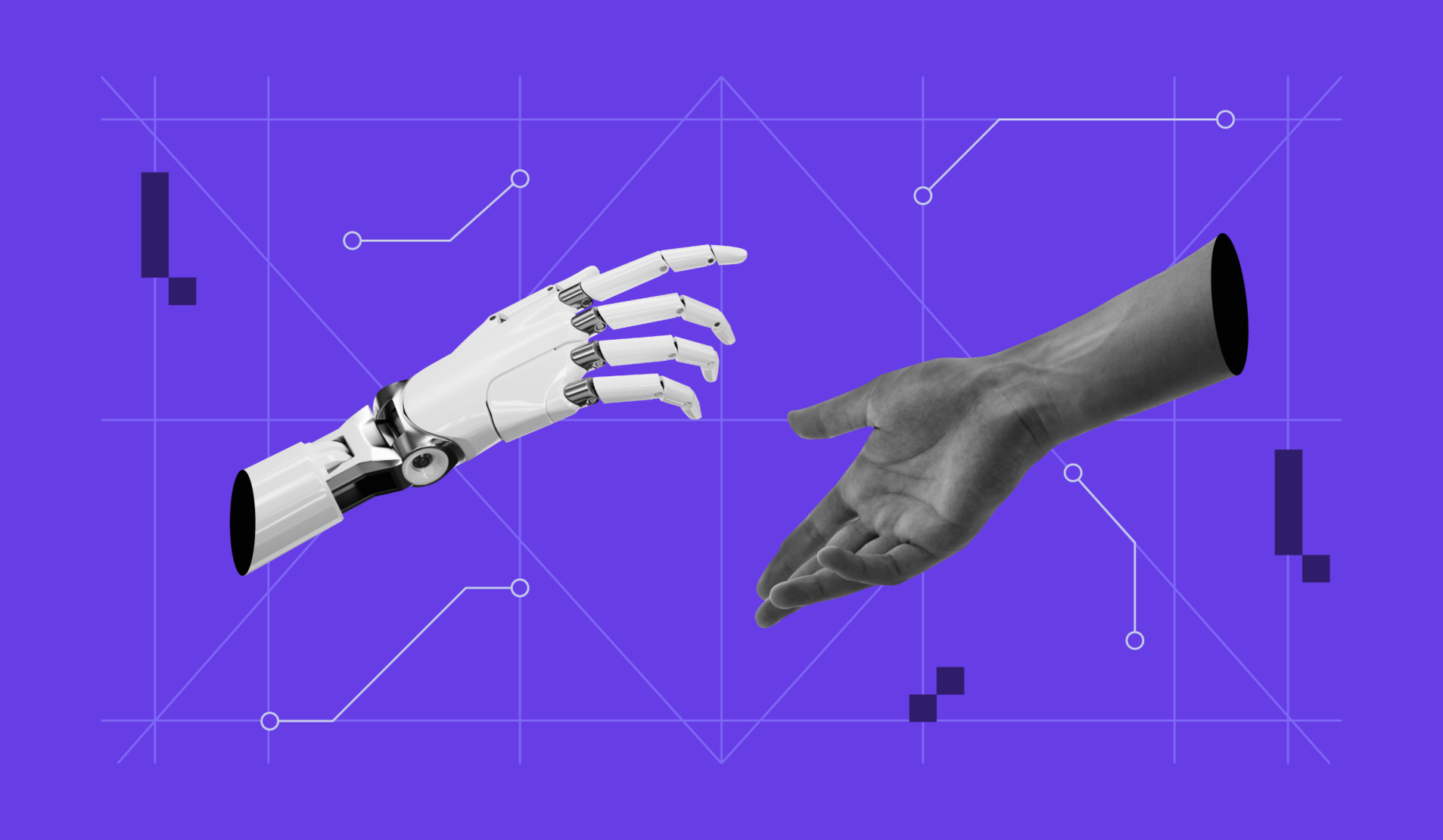
With so many talks and debates around artificial intelligence, it has become increasingly hard to separate fact and fiction. Is AI really a ground-breaking technology or a threat to humanity? Is it the future or nothing more than an overnight sensation?
We surveyed 800 Americans to understand the current public perceptions, beliefs, and common misconceptions around AI in the United States. Some of the results were expected, but some might surprise you.
How well do Americans know AI technologies?
A lot of misconceptions about AI stem from the lack of understanding of how the technology actually works.
According to our survey, 15.79% don’t know anything about AI, while 50.08% are somewhat familiar. Only one-third of the respondents (34.13%) are highly familiar with AI technology.
Here’s the more concerning part: only a small percentage (13.73%) of people who are familiar with AI actually understand its processes.
The rest either have some understanding of how it works (57.8%), or they simply know the term but not much beyond that (28.47%).
Americans associate AI with ChatGPT and chatbots
When asked which words are closely associated with AI, most people chose ChatGPT (69.18%) and chatbots (70.44%). AI content generation came third with 63.97% of the votes.
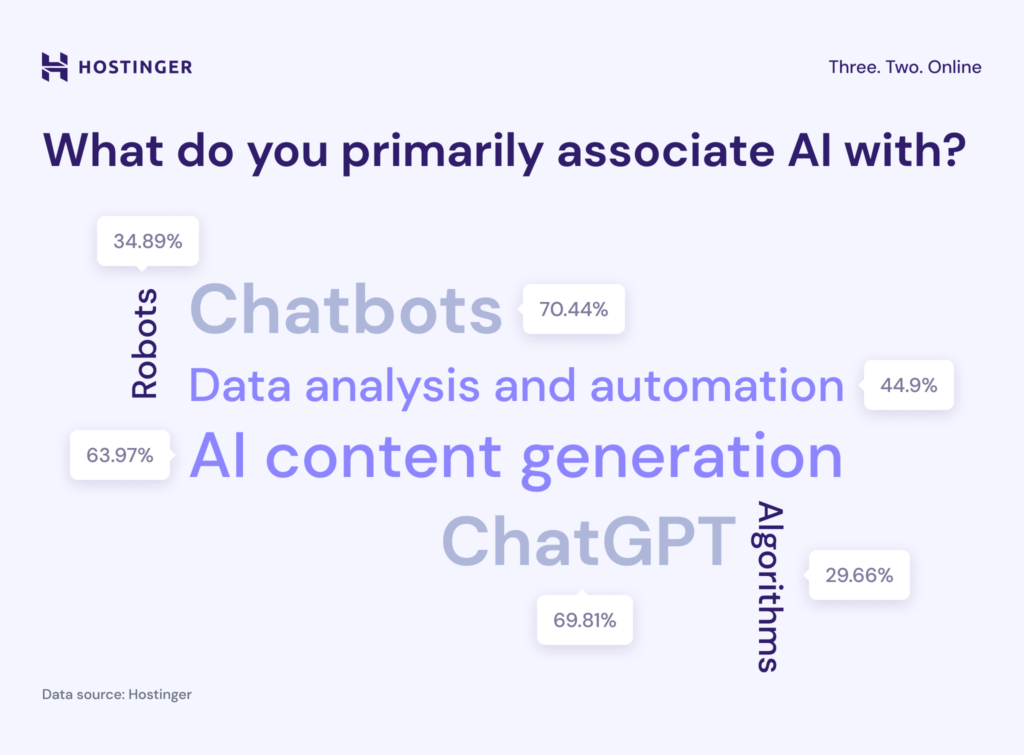
It makes perfect sense from a user’s point of view. ChatGPT took the world by storm in late 2022, and that was the first time a lot of people learned about AI and chatbots.
In the months that followed, we saw AI content generators popping up left and right. A lot of companies began leveraging AI-powered tools like Jasper, Copy.ai, and GPT-4 to create content at scale.
Men have more knowledge about AI technology than women
In terms of gender, we learned that men are more familiar with AI technology than women (40.7% vs 24.3%).
Moreover, 20.5% of female respondents were not familiar with AI, twice as many as their male counterparts (11.2%). There were also more males that have advanced knowledge of AI (18.1%) than females (8.8%).
Reality vs misconception about AI
Let’s explore and demystify some of the biggest myths about artificial intelligence we got from the survey.
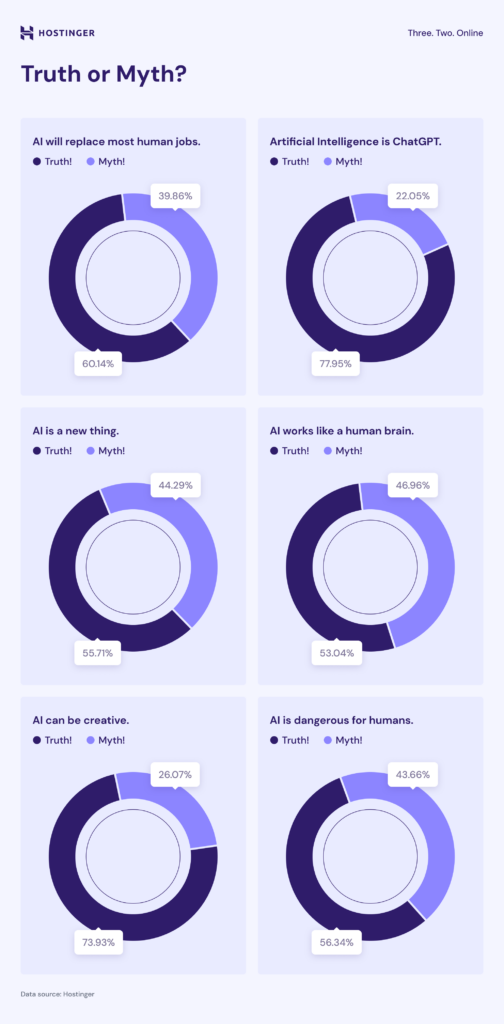
AI will replace most human jobs
Out of 800 survey respondents, 60.14% believe that AI will eventually take our jobs, and only 39.86% said it was a myth. After all, generative AI performs a lot of things we can do, in many ways better and faster than us.
The reality
AI is great at automating repetitive tasks and summarizing information we already know and agree on. But when it comes to critical thinking, creativity, and the ability to see the bigger picture, nothing beats the human brain.
Will AI replace humans? Likely not. At best, it will make our jobs easier – by automating mundane tasks, we can focus more on strategic work. At worst, it will make the job market a lot more competitive.
Either way, if you want to thrive in this new era, you have to continually adapt, learn, and specialize in skills that AI tools cannot easily replicate.
AI is ChatGPT
When asked if artificial intelligence is ChatGPT, 77.85% of the respondents said yes. Only 22.05% successfully identified the myth.
The reality
Artificial intelligence is an umbrella term that covers a broad spectrum of computer science designed to replicate human intelligence, including machine learning, deep learning, and natural language processing (NLP).
ChatGPT is just one example of many AI models. It uses machine learning and NLP to generate human-like responses to questions and prompts. If AI was a car, then ChatGPT would be the equivalent of Ford (or BWM, you get the point).
AI is a new thing
55.71% of the respondents think AI is a new technology. This is yet another proof that a lot of Americans had no clue of AI before ChatGPT became a thing.
The reality
The first mention of artificial intelligence goes back to the 1950s, when Alan Turin published a journal on Computer Machinery and Intelligence.
Since then, the development of machine learning technologies continues to change and evolve to this date.
AI works like a human brain
53.04% of Americans believe this is true, with 51.46% even going as far as saying that AI can surpass human capabilities in all areas.
The reality
If we understand how machine learning algorithms really work, then we know such claims are far from the truth. In the words of Bernard Huang, the founder of Clearscope, “large language models (LLMs) are basically sophisticated autocompletes.”
AI algorithms are trained using data gathered from billions of documents on the internet. When you enter a prompt, AI will give you the most probable answers based on its pool of training data.
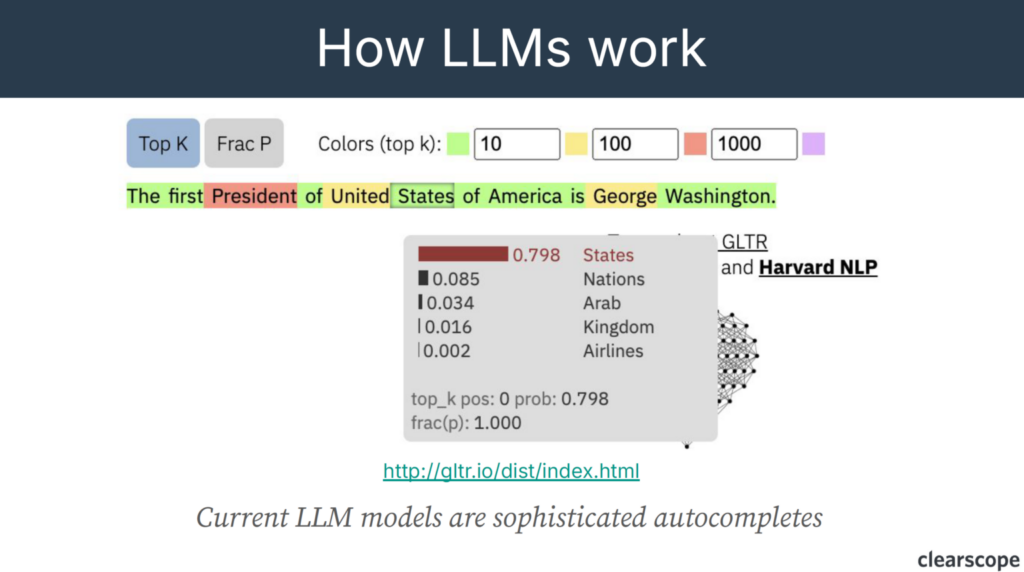
As you can see from the example above, ‘States’ is the most likely word to follow ‘United,’ with almost 0.8 probability. Here’s another great quote that sums up AI logic from Britney Muller, an international SEO and AI consultant:
“An LLM will focus only on the next probable words. It’s like a musician reading sheet music, moving through the notes one at a time. The goal is to figure out what the next words are likely to be.”
Sometimes, AI also suffers from hallucinations. You’ve probably seen this image of Google AI Overviews shared across Reddit and social media.
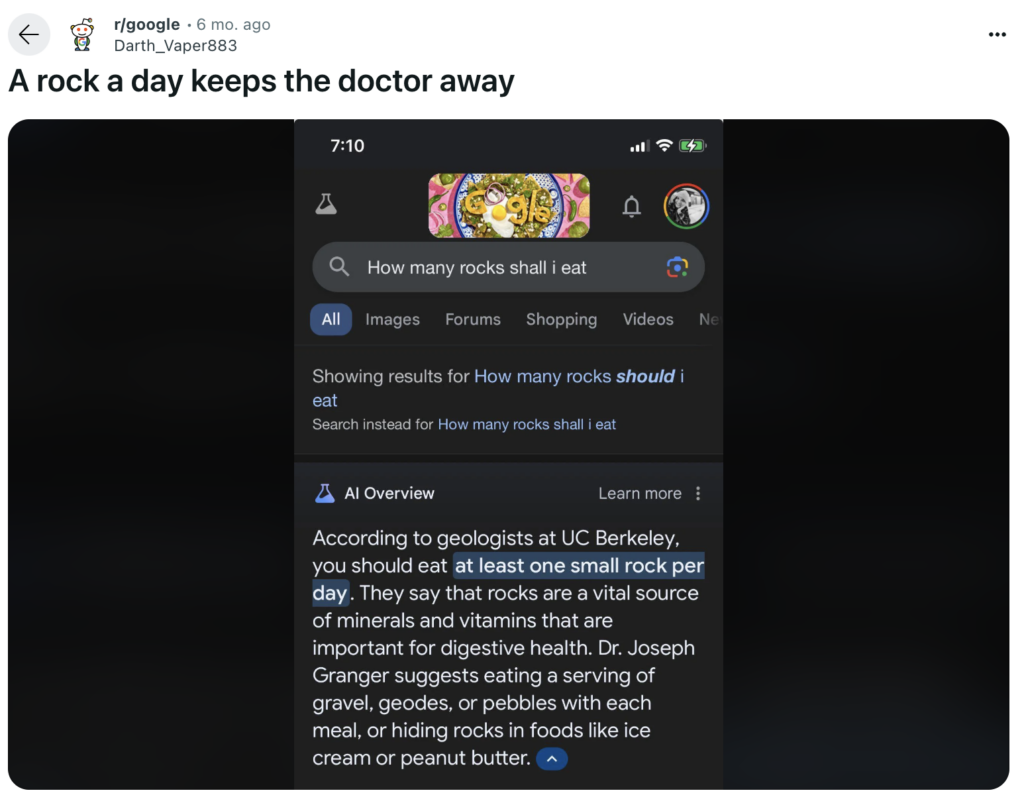
Maybe AI will get better and actually surpass human capabilities in the distant future. But for now, it’s scientifically proven as a myth.
AI can be creative
A staggering 73.93% of Americans actually believe that AI possesses true creativity the way humans do. Only 26.07% could smell the nonsense.
The reality
Yes, AI can help us brainstorm ideas, write scripts and articles, and produce visual artwork in images and videos. But these creative outputs are derived from existing data and learned patterns, not original innovation.
AI lacks the emotions, creativity, and imagination to create something entirely new, which is what makes our brain so powerful.
AI is dangerous for humans
We see tons of negative portrayals of AI in sci-fi movies and mainstream media. Elon Musk openly said that AI is one of the biggest threats to humanity. So, it was unsurprising when 56.34% of our survey participants believed that AI is dangerous for humans.
The reality
Like any technology, AI is merely a tool that needs human intervention. AI systems behave the way they’re programmed by human experts. We are the ones controlling it, not the other way around.
The only scenario where AI can be ‘dangerous’ is when it gives inaccurate, biased, and outdated information. But even then, we still have the power to decide how to use that data.
Almost half of the Americans still believe in these myths
Here are well-established AI myths that half of the survey participants continue to believe.
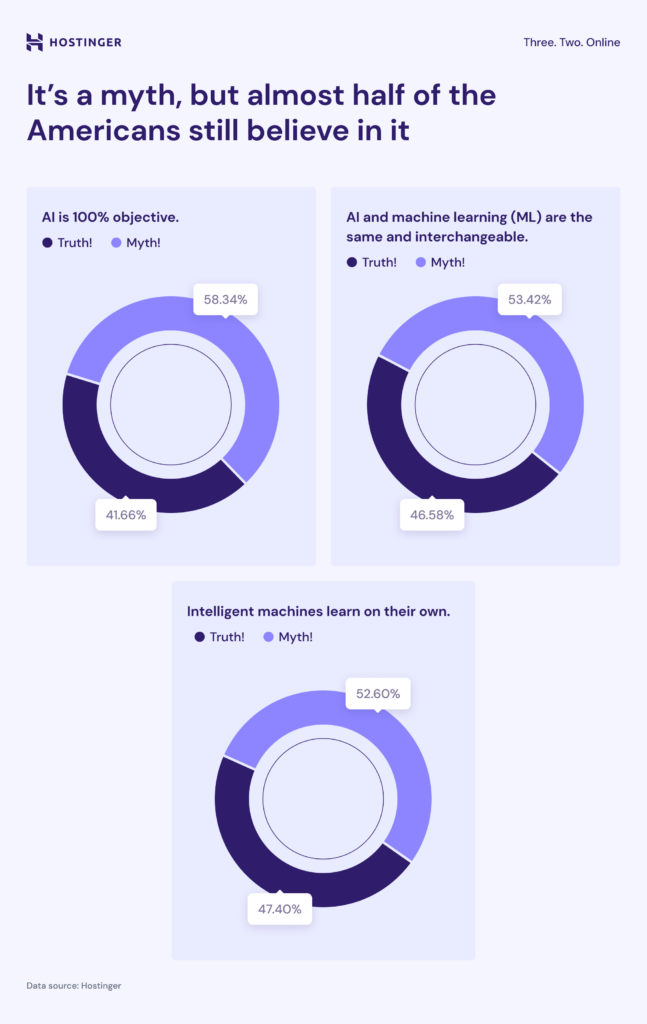
41.66% of Americans believe AI can be 100% objective
In reality, every AI system gathers data from the internet, which is inherently biased. Especially when it uses data from forums like Reddit or social media, where the content is often skewed by confirmation bias, personal opinions, and misleading information.
46.58% of Americans think AI and machine learning mean the same thing, and they can be used interchangeably
AI is a universal term that covers any technology used to simulate human intelligence, creativity, and problem-solving skills in a machine.
On the other hand, machine learning is a subset of AI that allows computers to learn from and make predictions or decisions based on data.
47.40% of people said that intelligent machines can learn on their own
This is partially true – machine learning algorithms do learn and improve on their mistakes, but they still need human feedback and guidance.
Let’s not forget that AI is actually trained by data scientists and AI engineers to understand human input and make decisions.
AI myths that Americans got right
We’ve explored the common AI misconceptions among Americans. But there are also some myths the majority of our respondents successfully debunked.
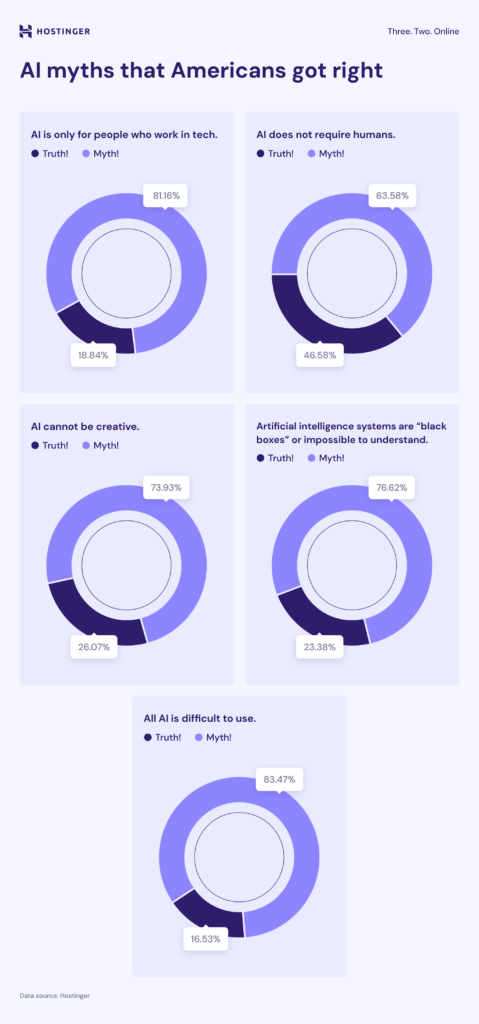
81.16% of Americans don’t believe AI is only for people who work in tech
That’s spot on – you don’t need to be a tech expert to use AI chatbots like ChatGPT. For example, more and more people are choosing to use AI search engines like Perplexity as alternatives to Google.
Does AI require humans to work? 63.58% of the respondents said yes
AI relies heavily on data, and humans are the ones who create, gather, and feed that data into AI algorithms.
76.62% believe the notion that AI systems are “black boxes” or impossible to understand is a myth
While AI systems can be complex to understand, it’s not impossible. There are countless articles, studies, and explainer videos you can access online to learn how AI really works.
83.47% of Americans don’t agree that AI is difficult to use
Most of you have probably used AI-powered tools like ChatGPT, Gemini, and Perplexity on a day-to-day basis. Some of you might even be an avid user of our own Hostinger AI builder, which helps you create a website in minutes.
Do Americans want to learn more about AI? Myth or truth?
Truth! More than half of Americans want to learn more about the accuracy of AI-generated results (57.05%) and data security when using AI (56.96%).
A big chunk of the respondents (48.22%) were also curious how exactly AI makes decisions – can AI really think by itself, or is it just following established algorithms?
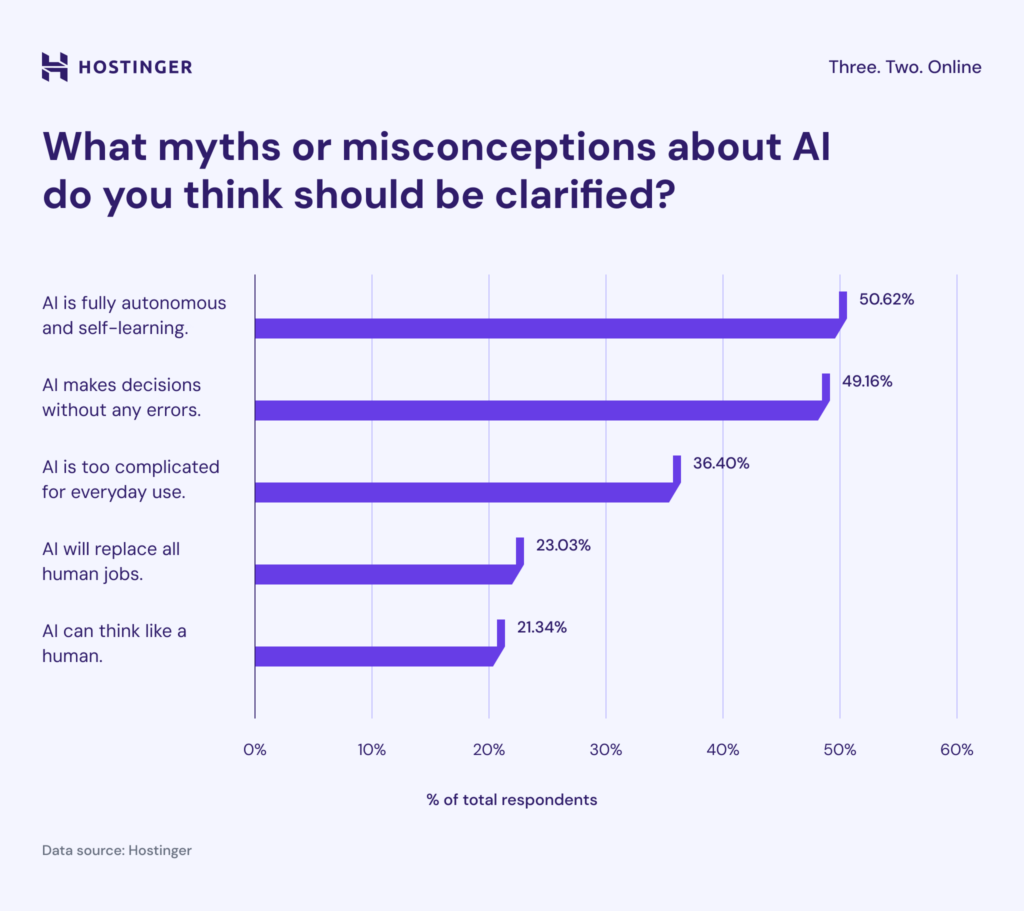
Moreover, half of the respondents mentioned that common misconceptions like ‘AI is fully autonomous and self-learning’ and ‘AI makes decisions without any errors’ should be clarified.
One third of the respondents (36.40%) also want to debunk the notion that ‘AI is too complicated for everyday use.’
In the end, knowledge is power. When we fully understand AI, we can use it to solve problems, boost our productivity, and make informed decisions better and faster.
The future of AI
Will AI become even more popular in the next five years? The majority of our respondents (79.85%) believe so. This reflects a growing interest and acceptance of AI as an integral part of our lives.
But as artificial intelligence grows even more powerful, companies and policymakers should be more proactive in addressing public concerns regarding AI safety and privacy, as well as its impact on employment.
Future studies should also focus on clarifying AI’s technical operations more. These include how AI algorithms work and how accurate AI-generated results really are.
We believe these steps will minimize further misconceptions and shape a more positive outlook toward AI in general.

